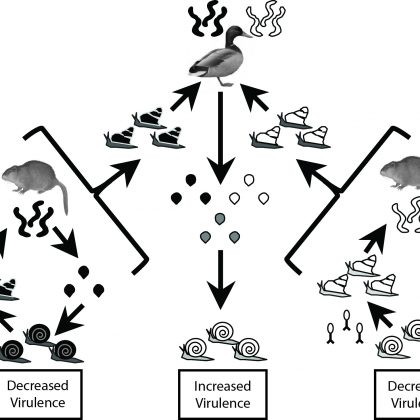Diversity and virulence correlates of metastrongyles in marine mammals
Metastrongyle lungworms could be particularly detrimental for diving animals such as marine mammals; however, little is known of the drivers of pathogenic host–parasite relationships in this group.
This systematic review analyzed the diversity of metastrongyles in marine mammals and the host and parasite traits associated with virulence. There have been at least 40 species of metastrongyles described in 66 species of marine mammals. After penalization for study biases, Halocercus hyperoodoni, Otostrongylus circumlitus, Parafilaroides gymnurus, Halocercus brasiliensis and Stenurus minor were the metastrongyles with the widest host range.
Most studies (80.12%, n = 133/166) reported that metastrongyles caused bronchopneumonia, while in the cardiovascular system metastrongyles caused vasculitis in nearly half of the studies (45.45%, n=5/11) that assessed these tissues. Metastrongyles were associated with otitis in 23.08% (n=6/26) of the studies. Metastrongyle infection was considered a potential contributory to mortality in 44.78% (n = 90/201) of the studies while 10.45% (n = 21/201) of these studies considered metastrongyles the main cause of death. Metastrongyle species with a wider host range were more likely to induce pathogenic effects.
Metastrongyles can cause significant tissue damage and mortality in marine mammals although virulent host–parasite relationships are dominated by a few metastrongyle species with wider host ranges.
The paper “A systematic review of the diversity and virulence correlates of metastrongyle lungworms in marine mammals” published in Parasitology is freely available to read online.
Author Biographies:

Mauricio Seguel: I’m a veterinary pathologist and wildlife scientist interested in the host and environmental factors that impact the ecology, immunology, and pathology of wildlife infectious diseases. Since July 2020, I have been an Assistant Professor in the Department of Pathobiology, Ontario Veterinary College (OVC), University of Guelph. I have worked for several years studying wildlife infectious diseases at Guafo Island, Chilean Patagonia and I collaborate on similar projects in Peru, the USA (California and Georgia) and South Africa. I also provide diagnostic consultation services for zoo and wildlife species and currently contribute to the diagnostic pathology service for the Toronto Zoo and the necropsy service of the department of Pathobiology at OVC.

Jared R. Fischbach: I’m an undergraduate researcher majoring in Bio-Medical Science with an academic interest in pathology, microbiology, and immunology. As a recipient of the University of Guelph President’s Scholarship, I completed my President’s Research Assistantship under the supervision and mentorship of Dr Seguel. My project focused on assessing the potential pathogenic role of helminths in wildlife species.






